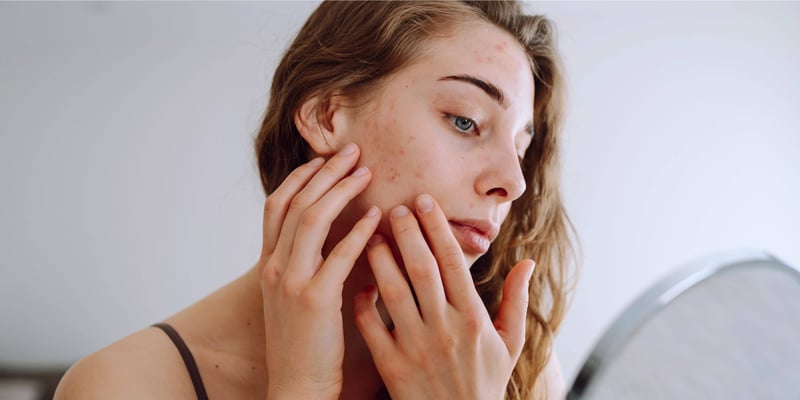Sunburn is painful and can damage your skin, and even though people know about the risks, many still get sunburned. We’ll cover sunburn treatment, tips to prevent it, and why it's important to protect your skin from the sun.
Understanding sunburn
Sunburn happens when your skin gets too much ultraviolet (UV) light, which damages the DNA in skin cells. Your body responds by sending more blood to the area, which causes redness, swelling, and pain. Severe cases can cause sunburn blisters.
How long does sunburn last?
Sunburn symptoms usually start a few hours after being in the sun and can last several days. Mild sunburns may heal in 3-5 days, while more severe ones can take up to two weeks. Your skin might peel as it heals.
How to treat sunburn
Treating sunburn quickly can reduce pain and help your skin heal faster.
1. Cool baths or showers
Taking frequent cool baths or showers can help relieve the pain. After your bath, gently pat your skin dry, leaving a bit of moisture [1][2][3].
2. Moisturise
While your skin is still damp, apply a moisturiser containing aloe vera or soy to soothe your skin. Aloe vera gel provides instant relief and promotes healing [2].
3. Pain Relief
Paracetamol can help reduce pyrexia and alleviate pain, being the least likely analgesic to cause side effects. Additionally, consider taking aspirin or ibuprofen to reduce swelling and discomfort [2].
4. Stay hydrated
Drink plenty of water, as sunburn draws fluid to the skin's surface and can lead to dehydration [2].
5. Blister Care
If sunburn blisters form, keep them clean and apply petroleum jelly to protect them while they heal. Avoid breaking any blisters as they protect the skin underneath. Cover them with non-adherent gauze if needed and keep the area clean [2].
Other soothing methods
- Cool compresses: Use a cool, damp washcloth on the affected areas [3].
- Calamine lotion: Apply to reduce itching [3].
- Oatmeal: Adding finely ground oatmeal to a cool bath can relieve itchy, dry skin and reduce inflammation [1][3][4].
- Witch hazel: Soak a cloth in witch hazel and dab it on sunburned areas to help with redness. While witch hazel primarily cleanses and fights inflammation, aloe vera is more moisturising and soothing. [1].
- Coconut oil: After the initial heat has subsided, use coconut oil to trap moisture and hydrate your skin [1][3].
- Honey: Raw honey can be applied directly to sunburned skin to soothe it [2].
- Apple cider vinegar: Adding a cup to a cool bath, along with coconut oil and lavender essential oil, creates a healing soak [3].
- Tea bags: The tannins in black tea can relieve pain and swelling when used as a cool compress [1][3].
Preventing sunburn
It's easier to prevent sunburn than to treat it. Here are some tips:
Use sunscreen
- SPF 30 or higher: Use a broad-spectrum sunscreen with at least SPF 30 on all exposed skin. Apply it 30 minutes before going outside and reapply every two hours, or more often if you are swimming or sweating [1][2][3].
- Cover all exposed areas: Don’t forget places like your ears, back of your neck, and tops of your feet.
Wear protective clothing
- Hats and sunglasses: A wide-brimmed hat can protect your face, neck, and ears. Sunglasses with UV protection can shield your eyes [1][2].
- Clothing: Wear long-sleeved shirts and long trousers made from tightly woven fabric.
Seek shade
- Avoid peak hours: Stay out of the sun between 10 AM and 4 PM when it's strongest [1][3].
- Check the UV index: Use sun protection when it's 3 or above [3].
- Avoid tanning beds and sunlamps: These emit UV rays that can harm your skin [1].
Recognising severe cases
Sometimes sunburn can be severe, and you need medical help.
When to see a doctor
- Blisters: If large areas of your body have blisters [1].
- Fever or chills (heatstroke): These might mean sun poisoning.
- Severe pain: If pain relievers don't help.
- Infection signs: If you see increased redness, pus, or swelling around blisters.
- Dehydration signs: If you have signs of dehydration, such as dry mouth, dizziness, or reduced urine output.
Sunburn and skin cancer
Getting sunburned often raises the risk of skin cancer, including melanoma. UV light damages skin cells' DNA, which can lead to cancer [2]. It's vital to protect your skin and check for any changes, like new moles or growths.
Sunburn can lead to long-term skin damage, premature aging, and increased skin cancer risk [2]. Protecting your skin from the sun is critical. If you have a severe sunburn with blistering, fever, chills, severe pain, or signs of dehydration, seek medical care [1].
Sunburn is common but can be prevented. Knowing how to treat and prevent it can help you enjoy the sun safely and avoid long-term skin damage. Always use sunscreen, wear protective clothing, and seek shade to keep your skin safe.
How HealthHero can support you
At HealthHero, we offer expert medical advice and consultations to help you manage sunburn and other skin issues. Visit our Dermatology GP Consultation page for more information and personalised care. Our specialists can help you choose the right sun protection and treatment options.




